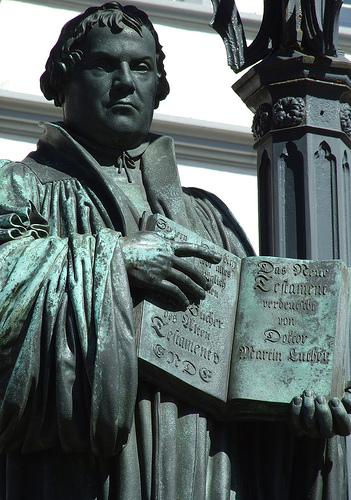 I learnt a great deal while preparing my paper for the recent Luther@500 Conference at Vose Seminary. None of it was original, of course, but a harvesting of the fruits of others’ scholarship informing my own engagement with Luther’s writings. The point most significant for me was the dawning recognition that Martin Luther was not always Martin Luther. This is one of those “obvious” facts, that sits on the edge of awareness but then the penny drops.
I learnt a great deal while preparing my paper for the recent Luther@500 Conference at Vose Seminary. None of it was original, of course, but a harvesting of the fruits of others’ scholarship informing my own engagement with Luther’s writings. The point most significant for me was the dawning recognition that Martin Luther was not always Martin Luther. This is one of those “obvious” facts, that sits on the edge of awareness but then the penny drops.
I had known that young Martin was born to Hans and Margarete Luder. In biographies and other Reformation sources, the family name is always applied to Luther’s parents. Yet, somehow, I had never gone on to ask the question, How and when and why did Martin Luder become Martin Luther?
In my research it became clear that the change had already occurred by the time Luther posted his Ninety-Five Theses, for the superscription for the Theses uses the name, although spelt Lutther. Whether this was intentional or a printer’s mistake in the facsimile I examined, I do not know. We know, too, that Luther sent a copy of his Theses to Archbishop Albrecht of Mainz on October 31, 1517, in the name of “Luther” (see Wengert, ed., The Annotated Luther Volume 1:The Roots of Reform, 34, 47-55). Bernard Lohse suggests that this was the first time that Luder adopted and used this name (Martin Luther’s Theology, 101).
Historians note that it was not unusual for humanists to adopt a Greek form of their name to produce a scholarly pseudonym. For example, the brilliant young humanist Philip Schwarzerd, who entered the University of Heidelberg at the tender age of twelve, is better known by his Greek name: Philip Melanchthon (Evans, The Roots of the Reformation, 273).
Around this time Luther also began using a Greek name when he signed his letters: eleutherius – the free one. Heinz Schilling suggests that as Luder’s work took him out of the academy and into the world of the common folk among whom the Greek name would be meaningless, “he preserved a reminder of the freedom that was at the heart of reformed theology: the central th in the Greek form of his name was carried over into his family name. Martin Luder became Martin Luther” (Martin Luther: Rebel in an Age of Upheaval, 139).
It is possible that Luther wanted to change his name for other reasons. Marcus Wriedt suggests that “Luder” bore the connotation as such words as ‘dirt’ or ‘garbage’ (“Luther’s Theology,” in Cambridge Companion to Martin Luther, 86). Whether in the sixteenth century the word had the colloquial connotations it does in the modern period—i.e. as a reference to a “common” woman considered an immoral “hussy”—I cannot say.
What is significant, I believe, is that Luther used his new name—indicative of a new identity?—in his first foray into the public sphere with the new theology that he had been developing and teaching at the Wittenberg University for several years. In his letter addressed to Albrecht, and in his Ninety-Five Theses, Luther was identifying as one freed by Christ and the gospel; freed from scholastic theology, freed from the fear of judgement, freed in order to help others find similar freedom.
Luther’s very name is itself testimony to the heart of his theological and pastoral vision: a theology of freedom issuing from the free grace of the free God who makes his people free. Scott Hendrix concurs: “From this point on [here, 1521], freedom for Luther meant living bound to Christ, and that freedom made him much more than a protester against indulgences or a critic of the pope. Now he was a man with a larger vision of what religion could be and a mission to realize that vision by making other people free” (Martin Luther: Visionary Reformer, 115).
Of course, Luther’s freedom is the paradoxical freedom of the one who has been found and bound in Christ. This is worlds away from libertarian concepts of personal and individual autonomy common today. It is the freedom of one so free they become free even from themselves, even from their own will to be free: they become servants of Christ and of others. This is the genius of Luther’s little tractate The Freedom of a Christian.